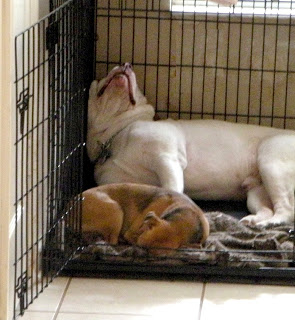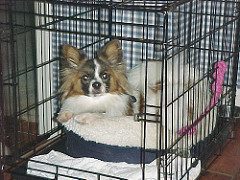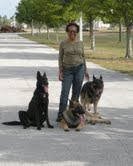Dogs
Find me on Facebook Follow me on Twitter Write to Dr. Jacki, ASK THE VET

Dear Judy:
My husband and I are planning to adopt a dog soon, partly for our son, and also for me to run with. We have decided to get a puppy, so we can bond with it from a young age, and raise it with proper house manners. He is worried about house training.
I have read about crate training and understand why it is good for the dog and the family. What I need is help for my husband to understand the reasoning, the long term benefits of using a crate, and the how tos in the beginning. Can you give us a crash course to supplement what I have read?
Thanks, Amy
Dear Amy:
- Crate Training A 10-week-old Puppy
Crate training is an essential element for successful cohabitation between pet and owner. Don't think of crates as cages for dogs. Think of them as dens, because dogs are instinctively den animals. Crates provide a clean, safe, and comfortable place...
- Proper Crate Training For Puppies
If you just brought home a new puppy, start its training immediately. One important aspect of training a puppy is crate training. Don't worry. It is not cruel to keep a dog in a crate. It is a dog's instinct to find a "den" and if you crate train...
- Crate Training Your New Puppy
By Ruthie Bently You’ve just gotten a new puppy and you decide to purchase a crate because it was suggested by your breeder or a friend. You have never had a dog before, let alone a crate; what do you do now? There are several guidelines when getting...
- Crate Training And Its Advantages
When I was growing up we had dogs but they were never crate trained. Crates were sold back then; my folks just chose to go without one. At night the dog would spend the night behind gates in the kitchen. Of course there was one Boxer named Jayne, who...
- Tips To Keep Cocker Spaniel At Your House
Cocker spaniels are considered by canine experts as one of the mostintelligent breeds. As such, housebreaking a cocker spaniel puppyis comparatively easy considering its high level of intelligencecoupled with its equable temperament. Of course, many tips...
Dogs
ASK THE TRAINER: Why Crate Train Your Dog?
Find me on Facebook Follow me on Twitter Write to Dr. Jacki, ASK THE VET
ASK THE TRAINER at All Things Dog Blog
(c) photo copyright Judith Joseph
Isn't Nap Time Grande?
Dear Judy:
My husband and I are planning to adopt a dog soon, partly for our son, and also for me to run with. We have decided to get a puppy, so we can bond with it from a young age, and raise it with proper house manners. He is worried about house training.
I have read about crate training and understand why it is good for the dog and the family. What I need is help for my husband to understand the reasoning, the long term benefits of using a crate, and the how tos in the beginning. Can you give us a crash course to supplement what I have read?
Thanks, Amy
-----------------------------------------
Dear Amy:
Though crate training is not as controversial today, there is still a stigma attached. Some owners aren’t sure whether crating is good, or if it’s “inhumane”. It is inhumane to leave a dog crated for long hours every day. However, proper crate training and usage provides dogs a safe, warm, and comfortable space.
At first I was opposed to crating, but my observations when working with dogs routinely crated was that they loved their crate, their “space”, and they felt safe from the unknown within it. My experiences with crate training dogs of all types revealed a recipe for success. The key ingredient of that recipe is The Introduction. Your dog should form a positive association with the crate from the very beginning. Developing a negative association with it could result in a barking, scratching, yelping nightmare.
Good Reasons to Crate Train Now:
- If used properly, crates are a quick and effective way to potty train pups and older dogs, as they prefer not to toilet in their bed.
- Young pups need training before having run of the house. As hard as you and I try, we can't keep our eyes on them 60 seconds of every minute.
- A crate is a safe play area for an hour or so when he needs to be out of the way so you can see about a baby, or your children, work your home business, do household chores or gardening, prepare dinner, shower--you get the idea.
- You won't have to "unteach" bad behaviors learned while you were not looking, like eating household plants.
- When you must leave him, crating protects your home from doggie damage. No coming home to torn pillows and chewed table legs. He will learn house manners easier with no bad chewing habits to break.
- Dogs develop a "den" lifestyle, choosing to retreat to their crate when they are tired or want to relax.
- Crates provide a secure spot in the car when traveling, preventing your dog from jumping around while you drive.
- Crating him while entertaining at home allows your dog to be present, but not in the way. No wagging tail knocking over drinks or wet nose sniffing chips and dip.
- Crate trained dogs are especially appreciated by pet professionals. They don't usually bark, scratch, or yelp when crated at the veterinarian's office, doggie daycare center, or dog salon.
 (C) photo copyright Carrie Boyko 2009Oliver Enjoys the Safety of His CrateIn short, crate trained dogs learn to appreciate down time in their own private space, out of mischief and the activity of the household.
(C) photo copyright Carrie Boyko 2009Oliver Enjoys the Safety of His CrateIn short, crate trained dogs learn to appreciate down time in their own private space, out of mischief and the activity of the household.
For tips on crate training and answers to common questions such as “what type and size crate to purchase”; “how to use crate for potty training”, “when not to crate”; “how to cure a crate barker”; and “where to put the crate”, visit Total Control Dog Owner Assistance .
Good luck,
JudyASK THE TRAINER Columnist Judith Joseph, D.O.I.ASK THE TRAINER at All Things Dog BlogSend your questions to:For more information on Judith Joseph and her training, you may find her at TCDOA Dog Training. A personal appointment will likely provide more specific information on your dog's issues and your questions.Alternatives to Crate Training Your Puppyby Judith W. Joseph, DOI, Professional Dog Trainer
Judith Joseph, D.O.I.ASK THE TRAINER at All Things Dog BlogSend your questions to:For more information on Judith Joseph and her training, you may find her at TCDOA Dog Training. A personal appointment will likely provide more specific information on your dog's issues and your questions.Alternatives to Crate Training Your Puppyby Judith W. Joseph, DOI, Professional Dog Trainer Follow All Things Dog at Twitter Find me at Facebook
Follow All Things Dog at Twitter Find me at Facebook
- Crate Training A 10-week-old Puppy
Crate training is an essential element for successful cohabitation between pet and owner. Don't think of crates as cages for dogs. Think of them as dens, because dogs are instinctively den animals. Crates provide a clean, safe, and comfortable place...
- Proper Crate Training For Puppies
If you just brought home a new puppy, start its training immediately. One important aspect of training a puppy is crate training. Don't worry. It is not cruel to keep a dog in a crate. It is a dog's instinct to find a "den" and if you crate train...
- Crate Training Your New Puppy
By Ruthie Bently You’ve just gotten a new puppy and you decide to purchase a crate because it was suggested by your breeder or a friend. You have never had a dog before, let alone a crate; what do you do now? There are several guidelines when getting...
- Crate Training And Its Advantages
When I was growing up we had dogs but they were never crate trained. Crates were sold back then; my folks just chose to go without one. At night the dog would spend the night behind gates in the kitchen. Of course there was one Boxer named Jayne, who...
- Tips To Keep Cocker Spaniel At Your House
Cocker spaniels are considered by canine experts as one of the mostintelligent breeds. As such, housebreaking a cocker spaniel puppyis comparatively easy considering its high level of intelligencecoupled with its equable temperament. Of course, many tips...
